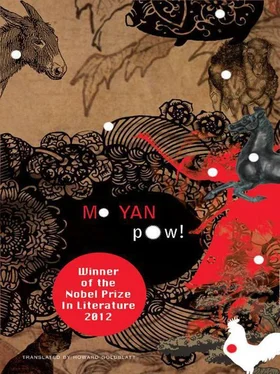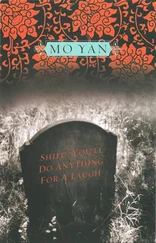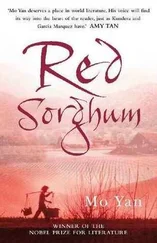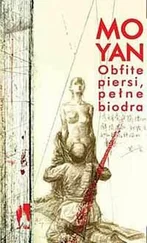Mother was dead, Father was under arrest. Lao Han, who supposedly knew the law, said that Father was guilty of a capital crime and that the best he could expect was a death sentence with a two-year reprieve. A death sentence without a reprieve was a distinct possibility.
Jiaojiao and I were now orphans.
I'll never forget the day they arrested Father. It was ten years ago today. It had rained heavily the night before, and the morning was as hot and humid as it is today, with the same blistering sun. A municipal police car drove into the village a little after nine in the morning, siren blaring. People poured out of their homes to stare. The car stopped in front of the village office, where Lao Wang and Wu Jinhu of the local militia brought Father out of the Township Station house. Wu removed the handcuffs and a municipal policeman came up and cuffed Father with a new pair.
Jiaojiao and I stood by the side of the road staring at Father's puffy face; his hair had turned white overnight. My tears flowed (although I must confess that I didn't feel all that bad). Father nodded to us, a signal for us to go over, which we did, hesitantly. We stopped a few steps before we reached him, and he raised his hands as if he was going to touch us. But he didn't. His handcuffs sparkled in the sunlight, temporarily blinding us. ‘Xiaotong, Jiaojiao,’ he said softly, ‘I lost my head out there…If you need anything, go see Lao Lan, he'll take care of you.’
I thought my ears were deceiving me. I looked to where he was pointing, and there was Lao Lan, his arms hanging loose, bleary-eyed from drink. His freshly shaved scalp was a mass of bumps and dents. He'd also just shaved, revealing a big, strong chin. His deformed ear was uglier than ever, actually quite pitiful looking.
After the police car drove off, the staring crowd slowly dispersed. Lao Lan wove his way up to us on unsteady legs, a look of abject sadness on his face. ‘Children,’ he said, ‘from now on you'll stay with me. You'll never go hungry as long as I've got food, and I'll make sure you always have clothes to wear.’
I shook my head to drive out all the emotional turmoil and concentrate my energy on thinking clearly. ‘Lao Lan,’ I said, ‘we can't stay with you. We haven't got everything figured out yet, but that's not going to happen.’
I took my sister's hand and walked back to our house.
Huang Biao's wife, in black, with white shoes and a yellow hair clasp shaped like a dragonfly, was waiting at the gate with a basket of food. She couldn't look us in the eye. I wanted to send her away because I knew she was there on Lao Lan's order. But I didn't have to; she laid the basket on the ground and left before I could speak to her, walking off quickly, wiggling her bottom and without another glance in our direction. I felt like kicking the basket away but the meaty fragrance stopped me. With a dead mother and a departed father, we were filled with sorrow, but we hadn't eaten for two days and hunger gnawed at our insides. I could go without, but Jiaojiao was just a child; every missed meal cost her tens of thousands of brain cells. Losing a little weight was all right but, as her older brother, how could I do justice to Father and Aunty Wild Mule if I let hunger turn her mad? I recalled some films and illustrated storybooks where revolutionaries capture an enemy field cauldron filled with fragrant meat and steaming white buns. In high spirits, the commander says, ‘Dig in, Comrades!’ So I picked up the basket and took it inside; I removed the food, laid it out on the table and, like the commander, said to my sister, ‘Dig in, Jiaojiao!’
We gobbled up the food like starving beasts and didn't stop till our bellies bulged. I rested briefly, and then it was time to think about life. Everything seemed like a bad dream. Our fate had changed almost before we knew it. Who'd caused this tragedy? Father? Mother? Lao Lan? Su Zhou? Yao Qi? Who were our enemies? Who were our friends? I was confused, I was undecided; my intelligence was being put to its greatest test. The face of Lao Lan flickered in front of me. Was he our enemy? Yes, he was. We were not about to take Father's advice. How could we possibly live at his house? I was still young but I'd led the meat-cleansing workshop and I'd participated in a meat-eating contest and, in the process, seen all those grown men bow their heads before me in defeat. I had been pretty tough to begin with; I was even tougher now. ‘When mother-in-law dies, daughter-in-law is matriarch. When father dies, eldest son is king of the roost.’ My father hadn't died but he might as well have. My time as king of the roost had arrived, and I had revenge on my mind.
‘Jiaojiao,’ I said to her, ‘Lao Lan is our mortal enemy and we're going to kill him.’
She shook her head: ‘He's a good man!’
‘Jiaojiao,’ I said earnestly, ‘you're young and inexperienced, and you can't tell what a man is like by his appearance alone. Lao Lan is a wolf in sheep's clothing. Do you understand what that means?’
‘Yes, I do,’ Jiaojiao said. ‘Let's kill him then. Shall we take him to the workshop first and give him the water treatment?’
‘“For a gentleman to see revenge, even ten years is not too long,” as they say. It is for me but we can't be in too big a hurry. Not today but not in ten years either. First, we need to get our hands on a good, sharp knife. Then, we wait for the right moment. We need to pretend that we're a couple of pitiful children, make everyone feel sorry for us, lull them to sleep. Then strike! He's a powerful man—if we fight him on his terms we'll lose, especially because he has the protection of the martial-arts master Huang Biao.’ I had to consider our situation from every angle. ‘As for the water treatment, let's wait and see.’
‘Whatever you say, Elder Brother.’
One morning, not much later, we were invited to share a pot of bone soup at the home of Cheng Tianle. Nutritious and loaded with calcium, the soup was just the sort of thing Jiaojiao, who was still growing, needed. It was a big pot, with lots of bones. If anyone knew his bones it was me—horse, cattle, sheep, donkey, dog, pig, camel and fox. Mix a donkey bone in with a pile of cow bones and I could pick it out every time. But the bones in this pot were new to me. The well-developed leg bones, the thick vertebra and the rock-solid tailbone put the thought of a fierce feline in my mind. Cheng Tianle was a good man, that I knew, and he liked me. He'd never do anything to hurt me, so there would be nothing wrong with what he fed us. Jiaojiao and I sat at a square little table next to the pot and began to eat, one bowlful followed by another and another, until we'd each had four. Cheng's wife stood by with a ladle, filling our bowls as soon as they were empty while Cheng urged us to eat our fill.
At Cheng's house we managed to get our hands on a rusty dagger with a blade shaped like a cow's ear. We didn't want a big knife but one we could hide on us, and this one fit the bill. We carried a whetstone into our house, turned up the volume on the TV, shut the door, blocked out the windows and then began to sharpen the knife with which we were going to kill Lao Lan.
My sister and I seemed to have become honoured guests at homes throughout the village during that time and were fed nothing but the best food. We ate camel's hump (a lump of fat), sheep's tail (pure lard), fox brain (a plate full of cunning). I can't list every item we ate, but I have to tell you that at Cheng Tianle's, besides bone soup, we were treated to a bowl of a green, bitter liquor. He didn't tell us what it was but I guessed its origin—liquor in which had been steeped the gallbladder of a leopard. I assumed that the bones in the pot were those of that same leopard. So Jiaojiao and I ate leopard gallbladder—the so-called seat of courage—which converted us from timid, mouse-like creatures into youngsters whose courage knew no bounds.
Читать дальше












